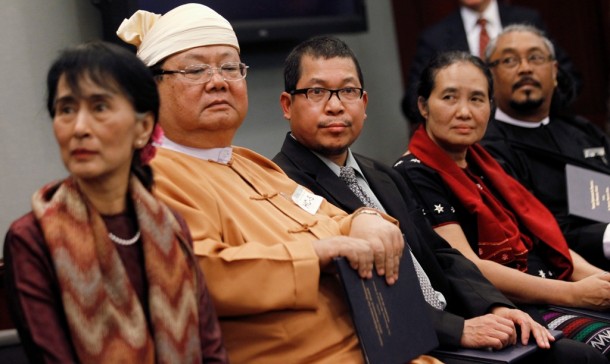RANGOON — Ethnic leaders have criticized the five-day Union Peace Conference in Naypyidaw, deeming it mere political posturing by President Thein Sein’s government.
On the first day of the dialogue, kicked off by the outgoing administration on Tuesday and intended to quell tensions between the Burmese government and ethnic armed groups, Commander-in-Chief Min Aung Hlaing urged armed groups to drop their weapons.
Khun Htun Oo, leader of the Shan Nationalities League for Democracy (SNLD), said that he was disappointed in the army chief’s message, commenting that the deep distrust felt by many ethnic groups should be a red flag that “it’s too early for disarmament.”
Only eight of Burma’s more than 20 non-state armed groups signed a so-called “nationwide” ceasefire agreement (NCA) on Oct. 15, with many objecting to the fact that other groups were barred from participating. Earlier this month, an alliance of armed groups that did not sign the October agreement announced that they will boycott the current dialogue.
“They always say, ‘put down your weapons, form a political party, contest elections and discuss ethnic affairs in Parliament.’ But I guarantee that will never work if the government doesn’t try to talk with ethnic armed groups first,” said Khun Htun Oo, adding that failure to do so would only dim the prospects of generating peace in the long run.
He also recalled what happened in 1990, when two ethnic parties and the opposition National League for Democracy (NLD) trounced opponents at the ballot box but were denied power. The aftermath of that election might have been different if political parties and armed groups had come together against former junta leader Snr-Gen Than Shwe, Khun Htun Oo said.
Aye Tha Aung, a central committee member of the Arakan National Party (ANP), contended that the government has been attempting to stomp out ethnic armed groups since Burma gained independence from British colonial rule in 1948, arguing that if the government actually wanted peace, it would have made provisions for ethnic self-determination, seen by many as code for federalism, in Burma’s 2008 Constitution.
“Discussion of disarmament won’t lead to sustainable peace,” he said.
The conference will run from Jan. 12 to 16 and is expected to attract some 700 representatives of non-state armed groups and the Union Peace Dialogue Joint Committee (UPDJC).

















